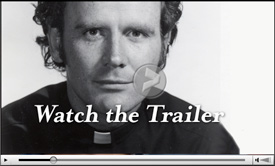A Reckoning With Faith
Press April 8th, 2008
Review in Sojourners by Judy Coode
More than seven years ago, James Carroll, award-winning novelist and Boston Globe columnist, wrote Constantine’s Sword, which traced the history of anti-Semitism in the church and also included Carroll’s personal reflections on his life as the son of an Air Force general and as a former priest.
Carroll’s book asserted that the rejection and suppression of Jews was a key facet of Christian theology, adopted at the time of the Emperor Constantine’s victory over his enemies in 312 and his subsequent promotion of the Christian faith. It was at that time that Con– stantine’s war-making was coupled with Christianity and both were infused with anti-Semitism.
Carroll’s significant research and reflection into this critical matter have been updated in a new documentary, also titled Constantine’s Sword, directed by Oren Jacoby. One of the film’s central themes, the historical connection between Western armies and Christian faith, is exemplified by the allegations of coercive tactics by evangelical chaplains, cadets, and staff at the U.S. Air Force Academy in Colorado Springs, which were publicized in 2005.
Carroll interviews people on both sides of the academy scandal, but the film’s sympathy lies with those who found the overt evangelization disturbing, intolerant, and offensive. Those on the other side tend to minimize the issue or refuse to recognize that blatant proselytizing is unacceptable at a government facility, and instead claim protection through the tenet of free speech.
Ironically, one of the defenders of evangelization at the school is Ted Haggard, the former head of the National Association of Evangelicals who was forced from his pulpit when a drug and gay-sex scandal caught him in 2006. In the film, Haggard insists that academy students are simply hearing another point of view when someone proselytizes to them, and that hearing a different “opinion” is the price one pays for freedom: “I drink Coke,” he says, “[but] I have to listen to a Pepsi commercial.”
Carroll’s visit to the academy also raises another theme of the film, which is his journey from a childhood within the Air Force—and an early infatuation with the life of a fighter pilot—to the call to question authority and to protest war and war-making.
The film focuses on Carroll’s personal journey (his relationship with his father, his decision to leave the priesthood, his pain at the church’s inability to admit its mistakes); the history of Constantine and Christian armies; and the horrific history of the church’s sometimes passive, oftentimes overt anti-Semitism. Less emphasized is the struggle between those who condone the use of state-sponsored aggression as a means to “bring peace” and those who believe Jesus calls Christians to reject all forms of violence, including legitimate military action.
Significant screen time is given to the history of Jews who moved to Rome after the Inquisition, and to the witness of St. Edith Stein, a woman who was born a Jew but who converted to Catholicism as an adult and joined the Carmelite sisters in Germany in the 1930s. She wrote a letter in 1933 to Pope Pius XI, warning him of Hitler’s treatment of the Jews and imploring him to use the moral voice of the church “to put a stop to this abuse of Christ’s name.” She never received an answer, and she went to her death at Auschwitz wondering if the pope ever considered her words—and knowing that the terrible things she had predicted came to pass.
The filmmakers have packed lots of footage in 90 minutes, with pieces as varied as interviews with biblical scholar Elaine Pagels and former senator Gary Hart; a clip of Dustin Hoffman as Lenny Bruce; and a heartbreaking and unexpected meeting with the caretaker of the Jewish cemetery in Mainz, Germany. After a few questions on camera, the old man breaks down and cries as he tries to express the obligation he feels to maintain the area. The translator later explains that the man survived Auschwitz, but his entire family perished there.
Constantine’s Sword
will leave viewers with much to consider, particularly Carroll’s final reflections on our current times: “I’m convinced this [war on terror] really is a crusade. Islam is accused of violence as if Christianity is innocent. … Every religious person has to take responsibility for the way in which their tradition encourages intolerance, suspicion, [and] hatred of the other.” His last words are “No war is holy,” and the final credits run while the Neville Brothers sing their haunting version of Bob Dylan’s “With God on Our Side.”
Judy Coode, a Sojourners contributing writer, is communications manager at the Maryknoll Office of Global Concerns in Washington, D.C.
Read the article online (registration may be required)
PDF of the Sojourners review









News and Updates